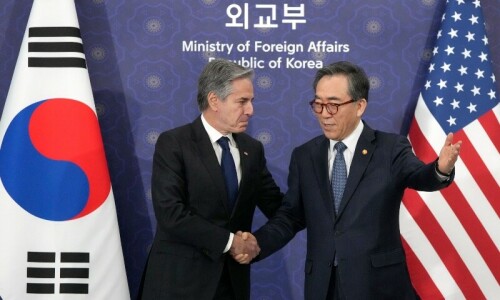
THE plains around the Gallipoli peninsula in Turkey are infused with memories of the Great War. This was the site for the bloody Battle of Gallipoli, or the Dardanelles Campaign, between the Ottoman Empire and the Allied forces that took place between Feb 17, 1915, and Jan 9, 1916. During my visit to the Gallipoli Battle Museum a couple of months ago, I came across an interesting facet of the conflict: it was the first psychological warfare campaign. “The planes of the Ottoman forces dropped propaganda sheets in Urdu for the Muslim soldiers of British India,” said a caption under one of the photographs there.
Read: What was the link between the Maghreb and World War I?
Why are we in the subcontinent oblivious to the participation of some 1.4 million voiceless Indian soldiers who were serving the British Empire during the Great War? Around the world these days one comes across commemorative ceremonies for the first industrialised war that shook the world a hundred years ago. It was known as the ‘war to end all wars’, though this is far from true. And though the distressing realities of the war and its trenches have materialised across debates and books, what remains scarcely remembered is the contribution of British-Indian (present-day India, Pakistan, Bangladesh, Sri Lanka and Myanmar) soldiers, of which some 73,000 were sent to their graves.
As waves of nationalism and anti-colonialism surged in the Indian subcontinent in the early 20th century, enthusiasm emerged for an independent India. Promises were made by the Empire to grant India independence after the Great War was over. Princely states swore loyalty and pledged their resources to the imperialists while the main political parties, including the Indian National Congress and the Muslim League, agreed to support the war effort, says Professor Santanu Das from Kings College, London. The Indian sepoys [sipahis] were then deployed across the Western Front to retaliate against the ‘enemy’ forces of their colonial rulers, in Mesopotamia, Gallipoli, North and East Africa.
Bullets, gas, and bombs decimated the sepoys but there are hardly any written accounts of these Indian troops who are now recognised as the largest voluntary army in the world. World War I history is heavily comprised of various forms of literature and journals, and the illiteracy factor amongst these soldiers doesn’t allow for much understanding of their experience. “Most of the soldiers were non-literate and hence did not leave behind the abundance of memoirs, poems and journals that form the cornerstone of World War I memory,” says Prof Das.
The Indian troop divisions had their own diversifying factors as well. There were ethnic groups such as the Pathans, Jats, Garwahalis and Gurkhas; the men straddled the Hindu, Muslim, and Sikh faith. They fought far from their homelands, unprepared, and against an enemy they did not know. Many were peasants and put their lives on the line to feed their families.
Mulk Raj Anand’s fictional Across the Black Waters presents the delirium of the Indian soldier while serving in the war. Anand, through his protagonist Lalu — an Indian sipahi under British rule — unflinchingly paints the confusion and naïveté that bind the soldier and his understanding of war.
The sipahis’ participation subjected them to marginalisation, given the British ideology of white supremacy. According to Prof Das, there were pockets of warmth and friendship between the Indian sepoys and their British officers, but the overall power-hierarchies and racism remained intact: the junior-most British officer was usually senior to the senior-most Indian soldier.
Ironically, one of the main reasons these soldiers are hardly remembered by the communities to which they belonged is because they were serving their oppressors. If the British had been more principled and had granted India self-rule after the Great War as they had promised, these troops would have been heroes.
The whispers of these forgotten soldiers susurrate in a collection edited by Davis Omissi, Indian Voices of the Great War: Soldiers’ Letters, 1914-18. In Omissi’s work, one comes across the coded echo of an Indian bugler from Kitchener’s Indian Hospital in 1915, reflecting the censorship that was prevalent to maintain the morale of the Indian army: “The black pepper is finished now. Now, the red pepper is being used, but occasionally the black pepper proves useful” — code for European and Indian troops.
Still, the fragmented accounts of these soldiers do not reflect the intensity of their experience. But weaving these in with prisoners-of-war recordings, photographs, and paintings could present some coherent picture of South Asians’ experience of the Great War. Prof Das, in his upcoming book India, Empire and First World War Culture: Literature, Images, Songs, aims to portray this. “We need to go beyond the battle-names and Victoria Crosses of military history and recover the human stories at the heart of the war,” he insists. “It’s not limited to the battles of Neuve Chapelle or Cambrai but diffused in a much wider sphere of culture, from Gandhi giving recruitment speeches to sepoys’ letters, poems and songs, to Muhammad Iqbal and Rabindranath Tagore writing about the war.”
Published in Dawn, July 20th, 2018










































Dear visitor, the comments section is undergoing an overhaul and will return soon.